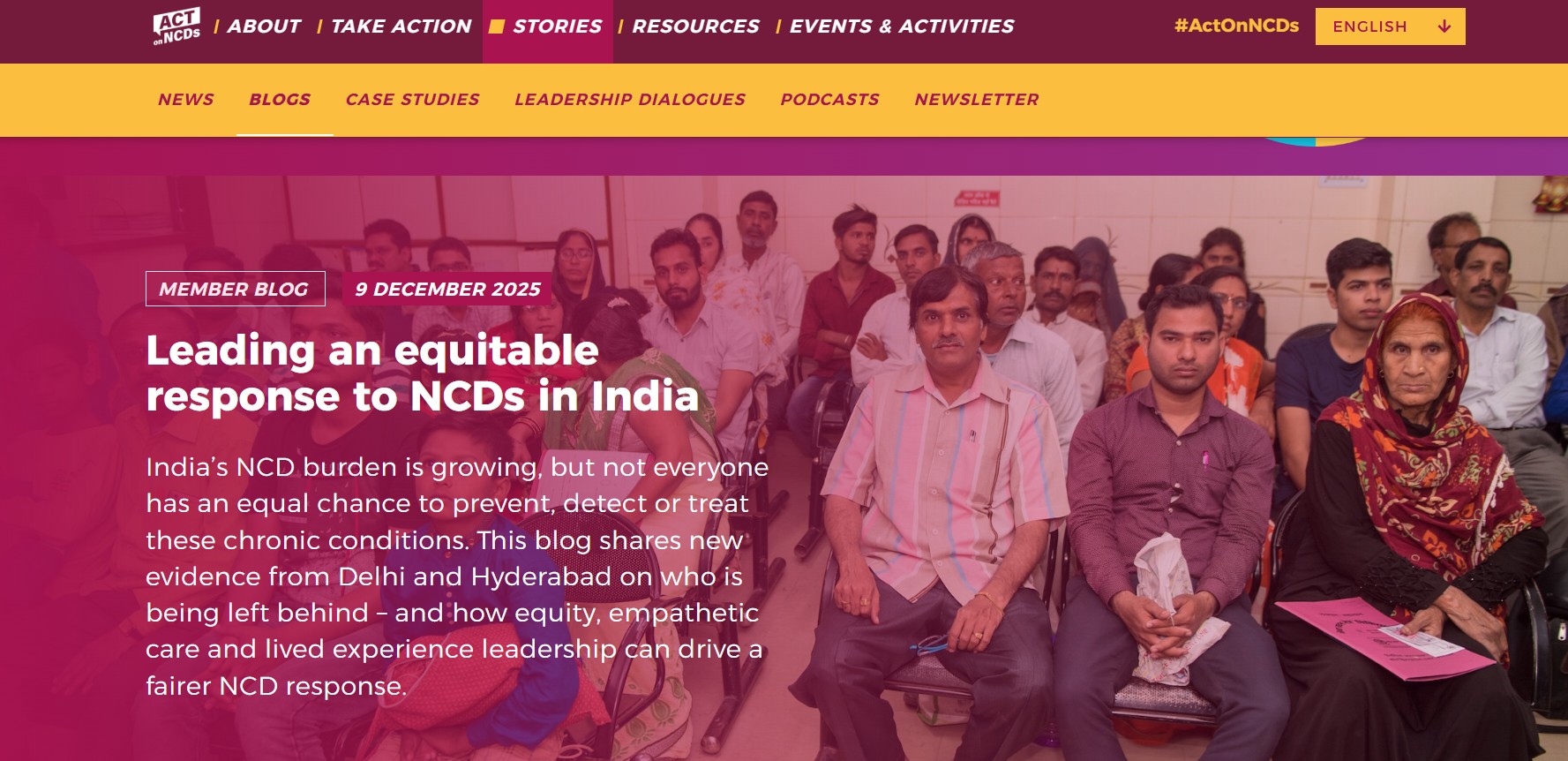The global health and equity crisis of NCDs and mental health is so vast that deciding how to respond can seem overwhelmingly complex. The best starting point, however, is no mystery. The primary health care approach is a globally scalable and holistic approach that holds the power to lessen the NCD and mental health burden and improve the lives of billions.
Two billion people live with NCDs including heart or lung diseases, cancer and diabetes. Of the 18 million people dying under the age of 70 from NCDs every year, over 80% live in low- and middle-income countries, where access to quality services that focus on both prevention and care is limited or unaffordable. Nearly 1 billion people worldwide are estimated to live with mental, neurological and substance use disorders, 1 in 7 young people aged 10–19 experience mental health conditions, and more than 720 000 people die by suicide each year.
The primary health care approach offers the most inclusive, equitable and cost-effective way to tackle this crisis. It enables integrated health services – spanning health promotion, prevention, treatment, rehabilitation and palliation – while systematically considering and acting on the wider determinants of health. Health services are put in place as close as possible to where people need them and are set up to be affordable for all. Importantly, the primary health care approach also empowers people and communities to have a meaningful say in protecting and improving their health and well-being.
Integrated primary care is effective, accessible and affordable
The primary health care approach places an emphasis on integrated health services that provide people with continuity, comprehensiveness and quality care from their first contact with the health system. A visit to a clinic to treat a common cold or other infectious disease is also an opportunity to monitor high blood pressure, check for early signs of diabetes, or screen for mental health issues and talk about available support.
This power to diagnose and treat multiple, often interconnected risk factors and conditions is fundamental in the prevention and control of NCDs and to accessible quality health care in general. A person living with diabetes is more likely to experience hypertension and heart disease, for example, and may be at increased risk of tuberculosis or to suffer from depression. Cardiovascular diseases are a leading cause of non-AIDS-related morbidity and mortality among HIV patients. Neglected tropical diseases (NTDs) can cause distress in affected people and their caregivers, including through stigma and discrimination.
A multisectoral approach to prevention
The second compelling aspect of the primary health care approach is its decidedly multisectoral and prevention-oriented lens. As the rising prevalence of NCDs and mental health conditions outpaces the capacity of health systems to respond effectively, tackling risk factors and determinants of health is increasingly urgent and requires interventions far beyond the health sector.
One in 8 people live with obesity and nearly one-third of adults are physically inactive. Tobacco use kills more than 8 million people every year. Alcohol consumption is associated with some 1.6 million NCD-related deaths. And a complex set of adverse, often related circumstances such as poverty, violence, disability and inequality puts people at increased risk of mental health disorders.
This is why addressing the broader determinants of health through multisectoral policy and action – in the environment, transportation, trade, labour and education sectors, among others – is particularly important for an effective NCD response. Moreover, the primary health care approach includes educating parents, peers and community leaders on healthy lifestyle choices such as proper nutrition, physical activity and stress management.
Content collection: Advancing Primary Health Care for Universal Healthcare Coverage: Strategies and Solutions
Community ownership and people-centred care
The primary health care approach brings essential prevention and care closer to the people and gives them a direct role in decision-making. Respecting and responding to the needs of individuals living with NCDs and mental health conditions implies actively and meaningfully involving them in all health-related decision making opportunities.
By design, primary health care is people-centred, valuing lived experience as a form of expertise that can transform health outcomes and empower individuals and communities by providing them with the knowledge and tools they need to take charge of their own health. This directly contributes to improved health equity, better self-reported health and higher satisfaction of people living with health conditions.
Engaging communities and people living with NCDs, and with mental, neurological or substance use conditions, can take many forms, for example strengthening social participation in health for indigenous populations in Bolivia, delivering prevention and primary care at the doorstep of underserved communities in Ghana, equipping women in Kenya to tackle obesity and hypertension, or integrating NCD diagnosis into remote primary care in the Maldives.
Promising developments and key messages
While many health systems are still primarily designed for providing acute care rather than fully embracing a primary health care approach, important progress is being made. In India, for example, the government has committed to putting 75 million people with hypertension or diabetes on care by 2025 – promising to be the largest ever NCD care expansion through a primary health care approach. Uganda has stepped up as a champion in integrating NCD, mental health and HIV services. Through the UHC Partnership, WHO is supporting over 125 countries to reorient and strengthen their health systems towards primary health care, while the Special Initiative on Mental Health has enabled 60 million more people to access mental health services.
These examples demonstrate the power of the primary health care approach to revolutionize global health and provide the entire continuum of care – health promotion, disease prevention, diagnosis, treatment, rehabilitation and palliation.
To tackle NCDs and mental health conditions, a primary health care approach can:
- provide integrated services that address major NCDs and mental health conditions, as well as shared risk factors, oral health, rehabilitation and disabilities;
- address the broader determinants of health through multisectoral policy and action, which is central to preventing noncommunicable diseases and tackling the mental health crisis; and
- empower individuals, families and communities to take ownership of their own health and well-being and have a meaningful say in all decisions relating to their health.
About the series
This commentary is part of a series highlighting priority areas to accelerate progress in the global NCD and mental health response and address related global health equity challenges ahead of the Fourth High-Level Meeting of the United Nations General Assembly (UNHLM4) in 2025. Discover the full series on the Road to 2025 campaign webpage.








